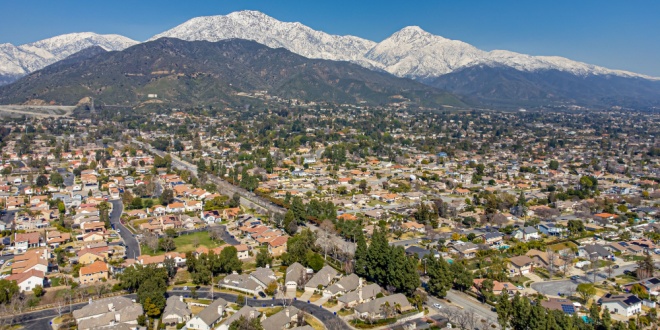The Association of Corporate Real Estate Executives (ACRE) Inland Empire showcase was held at the Doubletree by Hilton in Pomona, Calif. last month with several Inland Empire cities participating including: the Town of Apple Valley, the cities of Fontana, Hesperia, Lake Elsinore, Murrieta, Menifee, Ontario, Moreno Valley, Redlands, Rancho Cucamonga, Riverside, San Bernardino, and Eastvale. A few key takeaways were that we will see increased density, with residential being the driving force for retail and office space, and several cities are planning downtown redevelopment and revitalization projects with more stringent architectural requirements. Some towns will consider using properties they own to help facilitate increased density in downtown areas and will encourage development near public transportation hubs.
A great case study project for cities wrestling with the need for increased tax revenues and housing density required by the California housing crisis is the Colonies Crossroads Shopping Center and the surrounding community in Upland, which Diversified Pacific built under the leadership of founder Jeff Burum. In the 1990’s Burum surmised that the eventual completion of the 210 Freeway adjacent to the property would provide a constant traffic flow by the site. The demographics were strong and getting stronger yearly in the surrounding communities of Upland, Claremont, and Rancho Cucamonga.
The project that would become Colonies Crossroads had a difficult path to fruition and changed hands several times. Pinhill Development had previously named a plan for the area San Antonio Lakes. At the time, the project was envisioned as a large number of homes with a neighborhood shopping center anchored around 100,000 square feet. That plan never came to be because William Lyon Homes purchased the project in the latter part of the 1980s (when William Lyon was the largest private homebuilder in the country). Then, the property was lost when William Lyon filed for bankruptcy in 1992. Diversified Pacific acquired the property in 1996 under circumstances that were challenging for the city financially, and the project was re-envisioned.
A conversation with Upland mayor Bill Velto revealed just how difficult those times were for Upland and how much the Colonies Crossroads and associated projects that came to be meant to the city.
“In the 1970s, Proposition 13 took a great deal of revenue flexibility away from the City of Upland and every city in California and stressed them financially,” said Mayor Velto. Upland’s leadership had over the years rejected numerous development opportunities, including what would become The Montclair Plaza, a potential convention center and hotels, and other opportunities.
“The attitude of the City at the time was that we didn’t need or want any more large developments and that made the city have even further financial issues,” said Velto.
Upland was incorporated in 1906, and keeping up with the deteriorating infrastructure was further draining the city’s coffers. By the 1990s, Upland was feeling the pinch financially when Jeff Burum and the team at Diversified Pacific offered a lifeline in the form of a significant commercial development that became Colonies Crossroads.
Upland was looking at potentially significant budget cuts to core services such as police and fire protection. Burum’s vision for the property was to build a much larger commercial element that would provide a more lucrative and stable tax base for the city, along with a slight reduction in the overall number of homes and some increase in the density of the homes.
“The Colonies Crossroads development and the other projects it spawned, such as Tesla, is the top revenue producer regarding tax receipts for the City and almost single-handedly solved the financial issues that had plagued Upland for decades,” said Velto. “Jeff Burum is one of those few people that step up when needed and helps cities gain a better perspective. He brings in his team and assets and helps the cities in this valley improve and get stronger – Jeff is a Savant – a visionary and just sees things as they can be better than anyone else I know – he is one of the most brilliant omni-tasking people I have ever met,” said Velto.
Burum and his team successfully negotiated a deal with Target as the first major retailer to agree to open a store at Colonies Crossroads. The Target deal required that they own their site. Once Target was secured, others such as Kohl’s, (Chick’s) now Dick’s Sporting Goods, The Home Depot, and many others signed leases.
What was originally conceived as a relatively small commercial development by one developer became a 1,200,000-square-foot regional complex under Burum’s visionary leadership. With more than 50 retail stores and restaurants, the Colonies Crossroads has become one of the top destinations for Inland Empire residents to relax, dine, and shop.
As cities reconsider the model of what they look like, elements such as the covid work-from-home effect and the emptying out of city centers for more suburban environments that have become more appealing as fewer people commute to work must be considered. The Colonies Crossroads development in the words of noted economist of the Empire Jay Prag appear prophetic. “In many ways, Colonies Crossroads has become the new downtown for Upland. No longer are Uplanders taking their retail dollars to other nearby cities. Indeed, this easily accessible, popular combination of retailers attracts people – and tax dollars – from all of the neighboring communities and should be a model for other cities to emulate.”
 IE Business Daily Business news for the Inland Empire.
IE Business Daily Business news for the Inland Empire.


